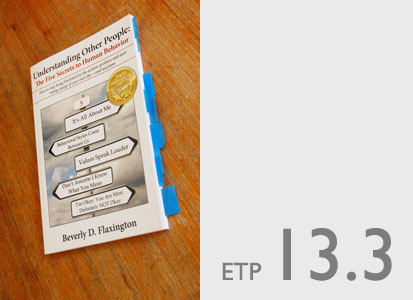Book: Understanding Other People by Beverly D. Flaxington
Wednesday, October 26th, 2011Just finished reading the book “Understanding Other People: The Five Secrets to Human Behavior” by Beverly D. Flaxington. The byline on the front cover says “How to stop being frustrated by the actions of others and start taking charge of your own life – and reactions.” It seemed like a promising resource with potential lessons for youth, especially those who may be encountering significant adult pressure. Can you imagine a youth trying to communicate with their parents or teachers, but having to deal with the “filters” described in this book? (Note: I think “filter” is not the best term since it implies a consistent loss of information processing whereas I feel it may be more a matter of translation or interpretation fidelity/efficiency at play). The premises from this book are:
1. It’s All About Me. To be able to view things from different perspectives is very important, especially with regards to innovation and leadership. However, there are times when “me” is an essential motivator and the “me” (or “us”) perspective matters the most.
2. Behavioral Styles Come Between Us. Recognition of behavioral styles is essential in any new situation. In a negotiating or mission critical scenario, it may be necessary to put aside prejudice against a certain behavior type; but an appreciation for behavior compatibility is crucial for healthy and productive teams.
3. Values Speak Louder. Values tend to intangible and difficult to identify accurately. Therefore, some latitude or additional data to analyze may be necessary before trying to rationalize a reason for a conflict. A values difference is quite easy to imagine as being an impediment in a youth-adult situation. Even if the youth has role models, it is difficult to list accurately the values that are being adopted.
4. Don’t Assume I Know What You Mean. Youth may be so anxious about being in the presence of adults that they don’t invest much time in setting context. They either want to get the encounter over with as quick as possible because of shyness/fear, or they want to get back to their friends or something they would rather be doing. It may therefore fall on the adult to encourage the youth to provide context.
5. I’m Okay; You Are Most Definitely NOT Okay. This is perfect advice for the adult who is interacting with youth. Critical judgement is definitely not the right message to send to youth when they are making their best effort. Makes me think about the frame of mind judges in a Science Fair should be in (they’ve already invested much of their time into the project before presentation day).
For the YCISL program, I think the above premises can be used to design an exercise (to be described later) to help youth become more confident in asking questions (a skill that should be nurtured as early in life as intelligently possible, but as we know often gets suppressed in school and at home ). Skilled question-asking is a powerful mode of communication and enables highly interactive discussions. Questions allow leeway in interpretation and (in network-speak) error-checking, and promote interaction continuity. It also has utility in innovation and leadership.
http://www.understandingotherpeople.com



